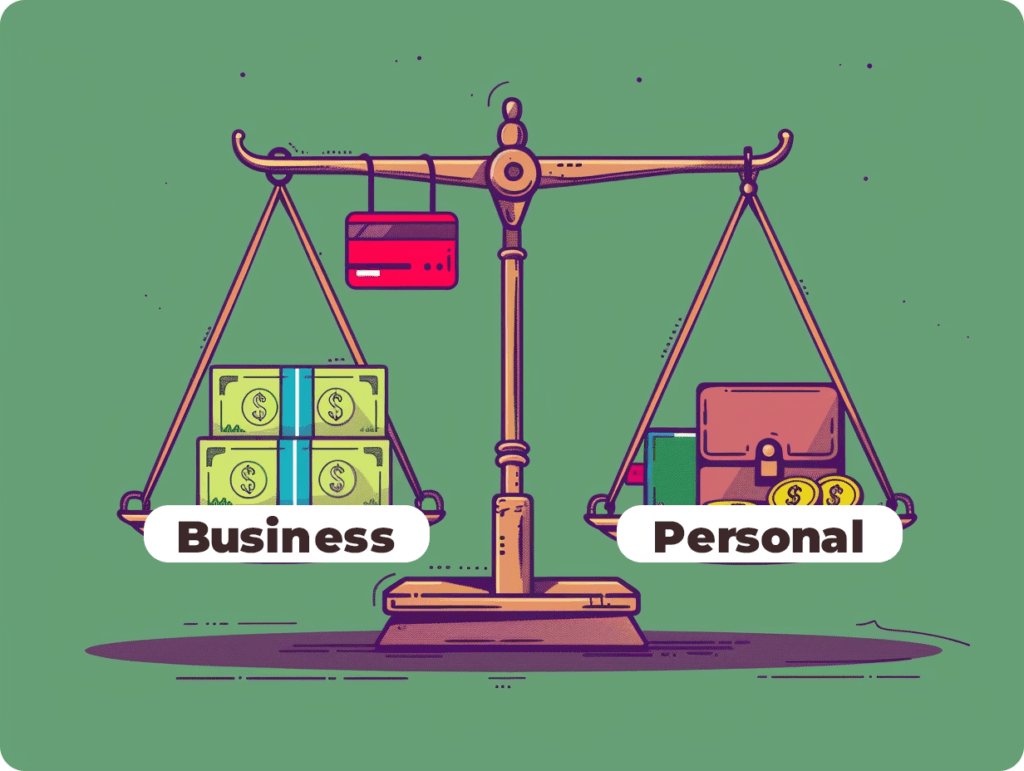- Blogs
- /
- An Easy Guide to Separating Business and Personal Finances
An Easy Guide to Separating Business and Personal Finances

Summary
Running a business is exciting, but it can also feel financially overwhelming. How do you keep your business flourishing while protecting your finances? The answer is to create a clear financial division, separating business and personal finances.
This guide will be your secret weapon. It will help you navigate the tightrope of managing personal and business money. We’ll explain why separation is crucial. We’ll highlight its benefits, from legal protection to peace of mind. We’ll also give you steps to get you started.
By the end, you’ll be able to separate your finances. You’ll improve your financial health, protect your assets, and stay legal. Let’s get started on achieving financial separation and success!
Key Takeaways
- Separating business and personal finances is vital. It is crucial for staying organized. It helps with tracking income and expenses. It also simplifies tax reporting and improves financial management.
- Separating business credit from personal credit has many benefits. It helps with legal compliance and avoids confusion between personal and business assets.
- It makes audits less stressful. It also protects personal assets from business risks.
- You achieve separation by setting up a separate legal entity. Then, you open a business bank account. You also get an Employer Identification Number (EIN). Finally, you build a business credit history.
- Educating all members about the importance of separation ensures they follow financial policies and fosters a professional and accountable culture.
- Proper bookkeeping helps. Avoid moving money back and forth. It’s practical for keeping things separate.
Recognizing Separation Need

Importance of Separating Business and Personal Finances
Separating business and personal finances is vital for staying organized financially. It helps you see clearly what money comes in and goes out.
By keeping them apart, you can easily track how much your business makes and spends. This separation also simplifies tax reporting. It makes showing the government your earnings easier.
Imagine if all your money was mixed up – it would be hard to tell which expenses were for work or personal use! Separating them creates a clear picture of where each dollar goes. This clarity not only helps with taxes but also improves overall financial management.
When your business and personal finances are separated, audits become less stressful. Auditors need to check that everything adds up correctly in your financial records. It’s like trying to solve a puzzle with missing pieces if mixed! However, auditing becomes smooth sailing when neatly divided into two accounts.
- In summary, the benefits of separating business and personal finances include:
- Precise tracking of business income and expenses
- Simplified tax reporting process
- Protection of personal assets from business risks.
Legal Implications
Legal issues often arise when there is confusion. They concern what belongs to the company and its owner. But by keeping separate accounts for each role (business vs. personal), there’s no debate. It’s clear who owns or owes whom! Plus, having separate bank statements proves that you run a professional operation.
Mixing up your money can lead to legal troubles down the road. To avoid this mess, keep your finances separate. Base them on their purpose: one account for work and another for personal use.
Separating business and personal finances isn’t just about rules. It also shields you legally! If something goes wrong in your company, like debts piling up or lawsuits flying around, your belongings stay safe. They are behind the financial barrier you’ve built.
Liability Protection
Tough times happen in business, leading to debts or lawsuits. Separate bank accounts protect against these. Homes and cars are personal assets. They aren’t at risk because they’re kept far from any trouble in the company’s coffers!
Split the funds. Put personal on one side and professional on the other. This way, if anything threatens business, like bankruptcy, only the business’s resources will be at risk.
Steps to Establishing Separation
1. Separate Legal Entity
Creating a separate legal entity is crucial. This means creating an LLC or corporation. It lets you separate business and personal finances, giving the business an identity apart from its owners. Doing this protects individuals from being personally liable. Otherwise, they are liable for any business debts or obligations.
It also allows for a clear split of personal and business assets. For instance, if someone sues the company, only the business’s assets are at risk. Not personal belongings like homes or cars.
In essence, it ensures that personal wealth and possessions are shielded in case of any issues related to the business. Knowing that one’s assets are safe even if something goes wrong with the company offers peace of mind.
2. Business Bank Account
Opening a dedicated business bank account is another vital step. It helps separate finances well, provides clarity, and keeps personal funds separate from those for the company’s operations. With distinct accounts, tracking income and expenses becomes much more straightforward.
A business bank account makes financial management easier. All company transactions flow through this single channel. Deposits and withdrawals linked to business can be handled efficiently and kept separate from personal money.
Also, a designated account just for your enterprise reduces confusion a lot. Individual expenses don’t mix with those for running your venture.
3. Employer Identification Number
Getting an Employer Identification Number (EIN) is critical. It lets you separate personal and business finances well. Think of an EIN as a social security number. But it’s specifically for businesses. It helps mark your enterprise as unique.
You need an EIN for many tax tasks. These include filing accurate returns based on your business’s earnings or losses. Also, banks often need this identifier. They need it when setting up accounts for businesses, not individuals.
Getting an EIN is easy now. You can apply online via the IRS website.
Business Credit and Building History
1. Personal vs. Business Credit
Separating business and personal finances establishes a clear line between personal and business credit profiles. Your credit reflects your financial history, while business credit represents its own.
By using separate profiles, you protect your credit. It guards against any issues linked to the business. Also, good business credit opens up more financing options. It boosts your venture’s credibility.
Separating finances lets businesses create a strong credit profile. One that is separate from your personal credit history. It’s a great chance to build strong business credit. You won’t have to rely on personal credit. This helps sole proprietors and new businesses with little personal credit. It enhances their access to financing options with good terms.
Consequently, creating good business credit without personal money helps the enterprise grow and succeed. It does so solely based on its financial merit. It ensures the company can stand on its own financially. It can access loans or other financing using its solid business profile. It won’t have to rely on individual finances for support.
2. Benefits of Separation
Separating finances has many advantages. It shields your assets from any company debts. It simplifies tax filings by showing what is yours and what is the business’s. Also, it makes financial dealings transparent with distinct accounts for different purposes.
Separating credits well can boost businesses’ chances at loans. This is due to their better credibility from a solid business profile. It is separate from personal finance.
Properly dividing credits fosters better financial management within an organization. Tracking expenses becomes clearer this way. Each account serves only personal or professional needs.
Lastly, keeping separate credits helps create a professional image for the company. Lenders see it as responsible and organized. This perception boosts loan approval rates.
3. Business Credit Reports
Separating business and personal finances is crucial. It creates a distinct credit profile for your business. Business credit reports offer insights into your company’s creditworthiness. They help lenders and suppliers assess your financial reliability.
With a good credit report, you can access better financing options and get favorable terms. You can do this by making timely payments and maintaining good credit practices. Keeping separate credit reports enhances credibility. It fosters trust among potential partners or investors. Regularly monitoring these reports lets you promptly detect any inaccuracies or fraudulent activities.
Business owners must prioritize paying bills on time. This upholds a positive payment history, which is essential for their credit. Separating finances ensures that all business expenses are paid promptly. It stops them from being paid with personal funds.
Consistent on-time payments build a good business credit history. They show financial responsibility and reliability. Avoiding late payments keeps good relationships with suppliers and vendors. It also shields the business from unnecessary penalties or interest. These charges could harm its finances.
Maintaining separate accounts when separating business and personal finances has a key benefit. It allows businesses to establish trade credit with suppliers effectively. Trade credit lets companies buy goods or services on deferred payment terms. They don’t need to pay immediately; this system helps them manage cash flow well.
Separate accounts help track trade credit transactions. They make financial dealings transparent and the organization accountable. A strong trade credit history opens doors to more purchasing power. It also fosters better supplier relationships. These are built on trust and reliability.
Avoiding Mixing Finances

Separating business and personal finances is essential for various reasons. First, it helps identify personal expenses that might mistakenly be considered business-related. Second, keeping finances separate helps people track their spending. Third, it ensures the correct allocation of costs and that the personal use of funds does not complicate taxes.
Furthermore, combining a deductible business expense with a non-deductible personal cost gets easier when finances are separate. For instance, if a small business owner uses their credit card for groceries and office supplies, separate accounts let them tell these transactions apart. This clarity contributes to accurate financial reporting and prevents potential errors or discrepancies.
Proper identification of personal use keeps the business financially honest. Members can quickly identify which expenses are personal. They help to uphold the separation of funds well. This knowledge helps ensure tax rule compliance. It stops the unauthorized mixing of personal assets with business assets.
Incorporating Your Business: Legal Entity Setup
Setting up a business involves creating a legal entity like an LLC or corporation. Your chosen structure depends on protection from liability, taxes, and ownership rules. Establishing a legal entity requires filing necessary documents with the appropriate government agencies.
Different business structures have specific formation requirements and ongoing compliance obligations. For instance, making an LLC may require drafting an operating agreement. This agreement outlines how the company will be run. Consult with lawyers. They can make sure you have a setup tailored to your business.
When starting a new business, you must consider the effects of each legal structure. An LLC offers limited liability protection for its owners. It shields personal assets from business debts and lawsuits. However, forming a corporation has tax advantages. But, it has more complex rules.
Opening Business Accounts
1. Bank Account
Opening a bank account for your business is crucial. It ensures that personal and business funds are separate, making it easier to track business income and expenses.
A separate account allows all business transactions to be centralized, simplifying financial management. This segregation also makes bookkeeping more accurate. It reduces the chances of errors in financial records.
A dedicated business bank account clearly distinguishes between personal and company finances. For instance, imagine you own a bakery called Sweet Delights. Open a separate bank account for Sweet Delights. This ensures that cupcake sales money goes into this account. It will not mix with your savings or spending money.
2. Credit Accounts
Keeping separate credit accounts for your business reinforces the divide. It further separates personal and company finances. Establishing separate credit accounts lets businesses build a strong credit profile independent of personal credit history. It helps track and manage credit use. It also ensures the business makes timely payments.
Having separate credit accounts is key. A good business credit score shows lenders and suppliers that you manage money well and do so in a way that fits the business’s needs. For example, Sweet Delights may need to buy ingredients on credit from its supplier, Sugar & Spice Co. A special credit account can help them do so without affecting their line of credit.
3. Applying for Business Credit Without Personal Credit
Businesses must build an independent credit history. This separation allows businesses to build a strong credit profile without relying on personal credit. For example, sole proprietors and new businesses usually have limited personal credit history. They can benefit greatly from this practice. By keeping business and personal finances separate. Any business problems will not hurt your credit.
Building good business credit enhances access to many financing options and gets you better terms. Businesses can apply for loans, lines of credit, or other financial products, using their solid credit profile as leverage. This approach also helps establish credibility and trustworthiness among lenders a ndcreditors.
Businesses can effectively ask for trade credits from suppliers or vendors. Trade credits let businesses buy goods or services on deferred payment terms. They do so without using immediate cash.
Furthermore, it helps manage cash flow well by providing a buffer between receiving goods/services and making payments. Requesting trade credits builds closer supplier relationships. If you have a positive trade credit history, it also boosts purchasing power by improving payment term availability.
Monitoring and Reporting: Credit Report Scanning
Regularly scanning credit reports helps track a business’s creditworthiness. These reports provide vital details about the company’s financial health and credit history.
Reviewing these reports can help you find errors, inaccuracies, or fraud. This helps in correcting discrepancies on time to ensure an accurate credit profile. Monitoring credit reports actively contributes to effective financial management and risk reduction.
Understanding different types of credit reports is critical. They are vital for managing finances in a business. Based on this info. Business credit reports show the company’s credibility with lenders and suppliers. They can affect future loan options for good or bad.
Personal credit reports are different. They examine a person’s financial background and show how creditors or employers view their trust. Various reporting agencies may use diverse formats or scoring models for these reports. Understanding each type well is necessary to interpret them accurately.
Regularly scanning credit reports helps businesses stay informed. They learn about their financial trustworthiness, which matters to creditors and vendors.
For instance, quickly finding differences lets companies fix errors. It stops them from growing into big issues that hurt their financial stability. Monitoring these reports proactively helps businesses. It lets them address risks before they cause extensive damage or hurt future growth.
Closing Thoughts
You’ve now grasped the importance of separating your business and personal finances. By seeing this need and setting clear boundaries, you’re preparing for financial success. You’re also taking practical steps. You’re opening business accounts and applying for business credit.
Remember, you wouldn’t mix oil and water. Keeping your finances separate ensures clarity, organization, and a solid foundation for your financial health.
Take charge today. Use these strategies. See how smoothly your finances flow. Your future self will thank you, and you’ll get peace of mind and stability from separating your business and personal finances well.
FAQs
How can I recognize the need to separate my business and personal finances?
You must separate your finances. This is crucial when using personal funds for business expenses or vice versa. If you’re unsure which account to use for a transaction, it’s a clear sign that separation is needed.
What can I do to split my business and personal finances well?
Start by opening separate bank accounts for your business and personal needs. Use different credit cards, maintain detailed records, and avoid mixing funds. Creating this clear distinction will help you manage your money more efficiently.
Why is building credit history important when separating business and personal finances?
Having distinct credit histories for your business and personal life helps. It makes it easier to secure loans or credit lines for each entity. It also safeguards your assets in case of any issues with the business.
Should I incorporate my business as part of separating finances?
Incorporating your business provides legal protection. It also gives a clear split between personal liability and company debts. This separation shields your assets from risk due to any potential business liabilities.
How do I apply for business credit to separate my financial matters?
To apply for business credit, get an EIN (Employer Identification Number). Then, build a good payment history with vendors. Also, check your credit score often. Consider applying for a small-business credit card. It is made to meet your business’s financial needs.
Our Latest Blogs:
FREE Strategy Session to Fix Your Credit Blogs / Facebook Twitter Linkedin Instagram Share Summary Over 300,000 Americans become...

ThisIsJohnWilliams

ThisIsJohnWilliams

ThisIsJohnWilliams
FREE Strategy Session to Fix Your Credit Blogs / Facebook Twitter Linkedin Instagram Share Summary Life can be unpredictable...

ThisIsJohnWilliams
FREE Strategy Session to Fix Your Credit Blogs / Facebook Twitter Linkedin Instagram Share Summary How to recover from...

ThisIsJohnWilliams






